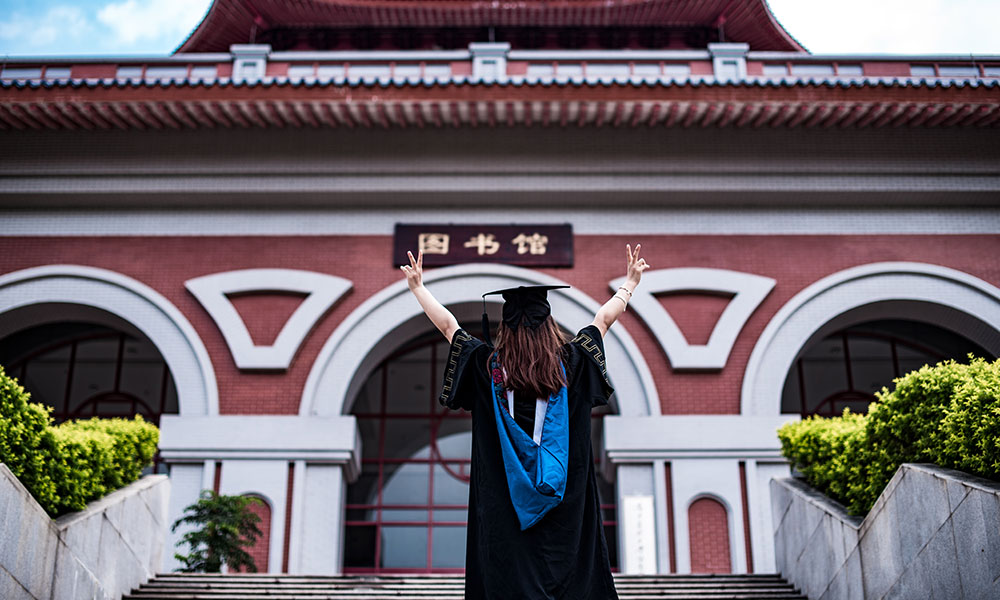China has become an international education center with more than 500,000 foreign students flooding into China every year with the promise of quality low-priced education and culture. Study in China for students is a good blend of high-quality institutions, English language programs, and huge scholarship programs. With 42 universities ranked in the QS World University Rankings 2026, China is catching up to Western education systems at significantly reduced prices—tuition at medical school typically costs between $3,000 and $5,000 per year.
Aside from reduced cost of study in China, students get globally recognized degrees, top-notch facilities, and cosmopolitan university lifestyles. This article explores benefits of study MBBS in China with a particular emphasis on scholarship opportunities. If you’re wondering whether studying in China fits your medical career goals, keep reading.

Why Study in China?
Higher education in china has made a resounding comeback, and it is currently one of the most popular choices for international students. The Chinese universities have already begun to establish themselves, with institutions such as Tsinghua University and Peking University being among the world’s highest-ranked international universities. The benefits of study in China are as follows:
1. Low Costs
As compared to the affluent west, where a year of medical school may cost $50,000 or more per annum, MBBS programs in China only run at $3,000–$5,000 per annum. The average cost of studying in China ranges between $3,000 and $10,000 per year, making it one of the most affordable destinations for medical education globally. Living expenses are similarly minimal, at $300–$500 per month in major cities.
2. English-Medium Programs
More than 100 universities, such as Nanjing Medical University and Zhejiang University, have English-medium programs, the highest being medicine. This does away with language issues for international students, Study in Chinas highlights, noting that no IELTS or TOEFL would be required if prior studies were conducted in English.
3. Global Recognition
Chinese university qualifications, specifically medical qualifications, are accredited by the likes of the World Health Organization (WHO), Educational Commission for Foreign Medical Graduates (ECFMG), and the medical councils of countries like the UK, USA, and India. Scholarship Roar further states that the graduates can practice medicine all over the world once they get the qualifying licensing examination like the USMLE or PLAB.
4. Cultural Immersion
Learning in China offers the chance to be immersed in a 5,000-year history while residing in cosmopolitan, up-to-date cities. While study in China, students gain cross-cultural competence, Mandarin language proficiency (usually optional), and exposure to a fast-growing economy, Top Universities states. Many students we’ve worked with have shared that China’s MBBS programs gave them not just a degree but a lifetime experience of cultural learning and professional growth.
5. Research and Infrastructure
China invests a lot in education, and medical learning has the latest technology, e.g., simulation centers and teaching hospitals. medical colleges like Shantou University Medical College have international practice-based clinical training, preparing students to practice medicine anywhere in the world.

Study MBBS in China
China is among the top options for medical students with its well-structured MBBS courses of 5–6 years with a one-year internship. The courses are internationalized by theory and practice. There are 45 universities that provide English-medium MBBS programs from top universities like Peking University Health Science Center and Fudan University.
Key Features of MBBS Programs
- Curriculum: The MBBS curriculum is comprised of basic sciences (anatomy, physiology) for the first two years and clinical practice from year three to five. The internship in the final year, conducted in affiliated hospitals, is practical training, according to Study in Chinas.
- Cost affordability: MBBS fees range from $3,000 to $10,000 annually, much lower than the US ($40,000–$60,000) or UK (£25,000–£40,000). Amber Student puts these much lower and continues on to say that scholarships can reduce cost of study in China to nothing.
- Global Opportunities: Study in China makes the students appear for international licensing examinations, i.e., USMLE (USA), PLAB (UK), or MCI (India). Scholarship Roar discovers that over 90% of MBBS students of major Chinese universities pass the exams because of rigorous training.
- English-Taught Programs: English taught university programs such as Tianjin University of Traditional Chinese Medicine offer MBBS with English and Mandarin course options to further promote increased cultural exposure, according to CUCAS.
- Clinical Exposure: With the massive population of China and advanced healthcare facility, clinical exposure is of the best quality. By study MBBS in China Students can work at hospitals that have the latest technology, with diverse cases, as China Admissions illustrates as one of the strongest advantages for medical students.
Challenges and Considerations
Even though it is very gratifying to study MBBS in China, students have to consider factors like ease of adjusting in a foreign academic and cultural background. Studying basic Mandarin makes daily life and communication with patients during internship more fulfilling, but not required in programs taught in English. The scholarship and university application process is also complicated with much document preparation like transcripts, recommendation letters, and health certificates, as required in the Chinese Scholarship Council website.

Which scholarships are available for international students in China?
Chinese universities and the government offer different scholarships to foreign students to attract talent from the entire world, e.g., accommodation, living allowance, and tuition fees. The scholarships reveal China and the medical education of China for students of developing nations and even developed nations. Below are the key scholarship programs for students to study in China:
1. Chinese Government Scholarship (CSC)
CSC Scholarship, sponsored by the Chinese Scholarship Council, is the largest and most competitive, which supports students at 274 host institutions. It offers, as specified on the council website:
- Coverage: Full fee, accommodation-free, full medical insurance paid, and monthly stipend (2,500 RMB undergraduate, 3,000 RMB master’s, 3,500 RMB PhD).
- Eligibility: All nationalities apart from Chinese can apply, having a cut-off age (below 25 years for a bachelor’s, 35 years for a master’s, and 40 years for a PhD). They need a high school certificate for MBBS or a bachelor’s degree for postgraduate medicine.
- Application: Apply online through the CSC system (December–April) or Chinese embassies. No IELTS will be required if the prior study was in English, Study in Chinas reports.
- Medical Focus: MBBS students who receive sponsorship through CSC are prioritized by universities like Nanjing Medical University and Zhejiang University, offering access to first-class facilities.
2. Provincial Scholarships
Some other provinces like Jiangsu, Hubei, and Guangdong also offer international student scholarships, typically to certain departments like medicine. The Jiangsu Provincial Scholarship, which pays a maximum of $9,800 per year for master’s in medicine, including tuition and some of the living costs. These are not as competitive as the CSC and are ideal for students considering regional schools to study in China.
3. University-Specific Scholarships
Most universities also provide their own scholarship, according to China Admissions. Xiamen University, for example, provides five scholarships in terms of full and half tuition fee waivers for students that study MBBS in China. These scholarships normally provide free accommodation and stipends, the application of which is simpler than that of CSC.
4. Confucius Institute Scholarship
Designed for the promotion of Chinese culture, this scholarship, as described on Top Universities, sponsors students pursuing medicine or other courses with the pursuit of Mandarin studies. It covers tuition fee, living expenses, and a living allowance, and it is applied through Confucius Institutes worldwide.

5. Bilateral and Other Scholarships
The CSC site documents bilateral arrangements with China and more than 50 nations, with the individualized scholarships provided to students from participating nations. Students from nations under the Belt and Road initiative, for instance, may be further funded for the study of medicine.
Application Tips
- Apply Early: Early application is recommended for scholarship application deadlines typically from December to April for the September intake, advises CUCAS. Transcripts, letters of recommendation, and study plans have to be prepared.
- Choose Universities Wisely: Choose quality-ranked universities with satisfactory medical courses and scholarship quota to pursuing higher education in china e.g., Peking University or Fudan University.
- Utilize Support Platforms: Chinas and CUCAS offer free application assistance, from verification of documents to matching with universities, to reduce errors.
- Emphasize Accomplishments: Scholarship Roar recommends that application owners emphasize academic achievements, extracurricular activities, and career aspirations in applications to stand out.
Advantages Beyond College and Scholarship
Study in China for students offers advantages beyond college and scholarship. International students gain:
- Career Opportunities: Exposure to China’s rapidly growing economy and international influence opens medical, research, and global career opportunities. Top Universities statistics validate that 80% of the graduates are in employment or further study within six months.
- Linguistic and Cultural Competencies: Gaining mastery of the Mandarin language, even at the basic level, increases the degree of international employability. Tuition-free language courses offered alongside degree courses have been proved to be in demand by Chinas studies.
- Networking: Campuses are represented by more than 180 nations through students, so campuses are a network worldwide. By study in China, students learn in the company of students from Asia, Africa, and Europe and then remain connected for life.
- Safe and Vibrant Environment: Chinese cities are famous for safety, up-to-date amenities, and lively student life. CUCAS highlights services such as airport pickup and round-the-clock supervision, which make the transition for international students easier.
How to Choose the Right Program and Scholarship?
Selecting the right university and scholarship for study in China for students requires planning and research. Adopt the following step-by-step process to choose the right program and scholarship:
- Choose Goals: Decide whether you want to pursue a full scholarship (e.g., CSC) or partial scholarship (e.g., provincial scholarships) to study in China. The aim for medical students should be WHO-approved MBBS programs in universities.
- Choose Universities: Browse CUCAS for 8,496 courses from 300+ universities in English-taught MBBS or postgraduate medical programs.
- Check Scholarship Eligibility: Go to Chinese Scholarship Council or Amber Student and check if you qualify based on academic and age criteria.
- Prepare Documents: Obtain transcripts, recommendation letters, study plan, and health certificate. Chinas has templates for convenience.
- Apply Early: Apply on CSC’s website or university websites like China Admissions that provide real-time tracking.
- Seek Advice: Websites like Scholarship Roar provide tips on writing winning applications, whereas Top Universities provides rankings to help in the selection of universities.

Real Experiences of Students Who Study in China
Foreign students who study in China, particularly medicine, have their lives transformed, as evident across sites like China Admissions and CUCAS. Affordability is praised by students, with MBBS tuition fees going as low as $3,000 annually, and scholarships like the CSC covering living expenses, easing financial burdens. For instance, a Nigerian MBBS student at Nanjing Medical University, featured on Study in Chinas, described the English-taught program as rigorous but doable, with hospital practical training boosting confidence. Cultural experience is another bonus—Indian and Pakistani students on Scholarship Roar spoke of picking up basic Mandarin, which enhanced patient communication during internships.
There are, however, challenges: one Kenyan student on AmberStudent noted some initial cultural adaptations but found university support, including airport pickups and mentorship, to be invaluable. Vibrant campus life in cities like Shanghai, described on Top Universities, forges international friendships, with students from over 180 countries collaborating together. These experiences, founded on actual student stories across the referenced sites, underscore China’s blend of intellectual rigour, cultural richness, and supportive milieus, which make it a life-changing destination for international students.
Conclusion
Study in China, particularly medicine, offer foreign students a lifetime opportunity of experiencing affordable yet quality studies in a multicultural environment. With affordable fees of $3,000 per year, English-medium MBBS programs, and internationally recognized degrees, China stands equal to Western universities but with affordable tuition through scholarship programs like the CSC, provincial award scholarships, and university awards. Outside class, students become culturally literate, access global networks, and open up career opportunities in one of the world’s most vibrant economies.
For medical students and others, China is not merely a destination to learn but the gateway to an educational and life experience that can transform one’s life. foreign students can tap into the complete potential of learning in China, opening the way for success in today’s globalized world. Ready to start your journey? Apply now for 2025 CSC Scholarships and study MBBS in China today.
1. What are the main benefits of studying medicine in China for international students?
Studying medicine in China is affordable, with MBBS tuition ranging from $3,000–$5,000 annually, compared to $40,000–$60,000 in Western countries. English-medium programs at universities like Nanjing Medical University eliminate language barriers, and degrees are recognized by WHO and ECFMG, enabling graduates to practice globally after passing licensing exams. Scholarships like the CSC cover tuition, accommodation, and stipends, while modern facilities and clinical exposure in affiliated hospitals enhance training, as detailed on China Admissions and Scholarship Roar.
2. How can international students apply for scholarships to study in China?
Students can apply for scholarships like the Chinese Government Scholarship (CSC) through the CSC portal (December–April) or Chinese embassies, requiring documents like transcripts, recommendation letters, and a study plan. No IELTS is needed if prior education was in English, per Study in China. Provincial and university-specific scholarships have simpler processes. Platforms like China Admissions offer application assistance, ensuring accurate submissions to universities like Peking University, as noted across the referenced websites.
3. What challenges might international students face when studying in China?
Adapting to a new cultural and academic environment can be challenging, particularly for medical students during clinical internships, where basic Mandarin may help with patient interactions, though not mandatory for English-taught programs. The scholarship application process can be complex, requiring careful document preparation, as outlined on the Chinese Scholarship Council site. Websites like Study in Chinas and CUCAS recommend early preparation and leveraging their support services to navigate these challenges effectively.





No comment